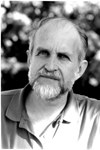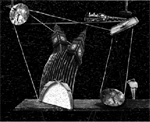 Clark Blaise
Clark Blaise
Several popular studies in the history of ideas and technology have appeared recently, notably Dava Sobel's Longitude and E=mc2, a brilliant account of Einstein's famous equation and its consequences by David Bodanis. Now comes a freewheeling portrait of the Canadian engineer, Sandford Fleming, and his work in establishing the modern system of standardized times and time zones. The author is Clark Blaise, an American of Canadian origin who for years worked in Montreal before going to the University of Iowa's famous school of creative writing, becoming its director. In 1997, tired of commuting to be with his wife, novelist Bharati Mukherjee, at Berkeley University, was seized by the idea for this study, threw up his job and the book he was writing and moved to San Francisco. The impulse also had something to do with a baseball star¨but that aspect of the story is unclear to a non-baseball person.
Blaise is a dazzling pitcher, not of baseballs, but of ideas, focusing on his subject the warm light of his knowledge and feeling. Literature, arts, technology, politics, diplomacy and even the author's personal and family history enter the story. The idea for time zones came to Fleming one June day in 1876 when he missed a train in Bandoran, Ireland, and had leisure to think about it. Ireland often provided the opportunity to miss a train, as Englishmen liked to report. In Drummod, Leitrim, it was said, there was a station-clock whose two faces did not tell the same time. An Englishman complained of this to the stationmaster who couldn't grasp the point he was making. The Englishman thought both faces should agree on the time. 'Sure, what would be the use of that?' the stationmaster asked.
The implications of standard time, an aspect of space-time which was required for the operation of railroads and for the greatly increased speed of communications which trains and the accompanying electric telegraph made possible, are immense. Time zones caused a revolution in consciousness and sensibility and were the catalyst for many discoveries. Standard time was the necessary first step in what we now call 'globalism'. Nor does Blaise miss the irony that technological change has often had the opposite effect of what its designers intended. Thus the telegraph and cable (Fleming is also the father of the trans-Pacific cable), which were meant to hold the British Empire together, in fact led to its disintegration. This insight is at the heart of Innes' and McLuhan's work, perhaps caught from the Irish historian W.E.H.Lecky, who remarked in 1896 that the telegraph took away the metropolitan advantage of first access to information, and led to the proliferation of local newspapers throughout the empire. We have seen in our own time the acceleration of communication result in a world-wide resurgence of bloody tribalism and irredentism. It looks as though the better we understand one another the more we find to dislike.
 The author sees the institution of time zones and standard time as a victory of the rational over the 'natural', a process described by sociologists as 'modernization'. I think of a remark in W.B.Yeats's Autobiographies, 'I have nothing but reason to be my guide, and so am constantly in doubt about small matters.' There's a similar thought in T.S. Eliot: 'Shall I part my hair behind? Do I dare to eat a peach?' You can tell to what extent we have become rational by the enormous volume of how-to books we buy. We no longer follow tradition in everything¨except in language, the central element in culture. Without observing the received forms of language we could not understand one another. And in fact some forms of language, officialese for example or street jive, are meant to be meaningless to the laity.
The author sees the institution of time zones and standard time as a victory of the rational over the 'natural', a process described by sociologists as 'modernization'. I think of a remark in W.B.Yeats's Autobiographies, 'I have nothing but reason to be my guide, and so am constantly in doubt about small matters.' There's a similar thought in T.S. Eliot: 'Shall I part my hair behind? Do I dare to eat a peach?' You can tell to what extent we have become rational by the enormous volume of how-to books we buy. We no longer follow tradition in everything¨except in language, the central element in culture. Without observing the received forms of language we could not understand one another. And in fact some forms of language, officialese for example or street jive, are meant to be meaningless to the laity.
It is, however, not clear how 'scientific' the technology of time actually is. Surely all measurement is arbitrary. Are only the relations between measurements science? The metric system is no less arbitrary than miles and inches. Of course, there's nothing wrong with arbitrary rules¨without an arbitrary rule to drive on the left or on the right of the highway there would be havoc. Fleming and the French delegation to the prime Meridian Conference of 1884 in Washington argued for a 'neutral' and 'scientific' prime meridian (i.e., the meridian at which numbering would start). What the French meant was a meridian that was not Greenwich, that is British and Anglo-Saxon. Fleming wanted a meridian in the empty Pacific, so as not to annoy the French. But after all, this would not be a scientific solution to the problem, not one guided by Cartesian logic. Arbitrary it had to be, and as it happened, Greenwich (whose charts were in use world-wide) was the most convenient choice for world shipping. The French bowed to the decision, though they could not bring themselves to call the prime meridian Greenwich. It is the historic mission of France to claim leadership not only in French culture, but in Culture.
Blaise is primarily a story teller, and tells his story compellingly. There are passages in which his eloquence deserves the Welsh term 'hwll', which denotes the quality of an inspired Baptist sermon. His book, like other recent popular essays in the history of ideas, is not only profoundly interesting but also enjoyable. I get off on passages like this: 'We are eternal. Our bodies are the skeletons of dead stars and in the fullness of time we return to our makers. The universe seems vast and Manichean¨the super-hot, super-dense quantum cloud, timeless and spaceless, of infinite heat and density that preceded the big bang, twinned to the universal collapse of light and matter into the infinite gravity of the black hole. From one, the unvierse and all its creations, including time, are released. From the other, nothing, not even time, escapes. Both are mathematically inexpressible '"singularities," predicted, but even[tually] resisted, by Einstein. In the Alpha and Omega of creation, contrary to his assurance, God does play dice with the universe.' ˛